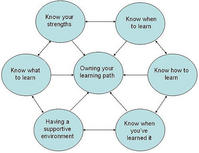| Sunday, August 19, 2007 |
| Tools for learning |
 This is the chart that Ton Zilstra and Elmine Wijni put up for their converstion on Owning your learning path at the last Reboot conference. I don't know if we particularly arrived at any conclusion, but learning is an important subject, and maybe we made some kind of progress. How can one own one's own learning path, i.e. take responsibility for arranging things so that you really learn what you want to learn, and you know what you learn, etc. This is the chart that Ton Zilstra and Elmine Wijni put up for their converstion on Owning your learning path at the last Reboot conference. I don't know if we particularly arrived at any conclusion, but learning is an important subject, and maybe we made some kind of progress. How can one own one's own learning path, i.e. take responsibility for arranging things so that you really learn what you want to learn, and you know what you learn, etc.
One inroad to any subject is of course to break it down a bit into components. Like, from that chart, for learning:
Actually it gets me to think about a more general subject: how to create tools to support any of a number of purposeful activities. You know, if there's something you want to do, there are of course tools that help you organize your progress towards doing it. I'm thinking of personal or group organization tools, like in a program or web page. And I'm very interested in the general subject of patterns, and of how to arrange things so that certain things are likely to happen. For example, just by creating a few bins for certain named bits of information, you're creating an organizational structure that makes certain things more likely to happen. If you simply made a web application that had 6 boxes, where you could write answers to What To Learn, When To Learn... etc, you'd already have something. That would force you to pay attention to these things and come up with answers you maybe otherwise wouldn't think of. But I'm also thinking of a type of software that doesn't really seem to exist. One that guides you through an activity in a way that corresponds with what you're trying to do. For example, if you were doing a brain storming session, you'd need some tools that inspired you to come up with new ideas, so maybe various kinds of random input that stimulates lateral thinking. And you'd need some bins in which you can place whatever you come up with, and maybe some other bins for picking out the most promising ideas Or, if you were having a meeting with a particular goal, the organizational system would be different. There it wouldn't just be about coming up with ideas, but about ending up with a solution, or an agreement. So, you need different tools to help you do that, that show you how much progress you've made towards the goal, and what's still missing. Different tools are calling forth different patterns. A blog or a wiki or a chat room each make you do different things. Like, a blog, even if it is collaborative, doesn't help you to arrive at common decisions. Rather, it helps you post anything you feel like, taking the conversation in different directions, but probably not towards a point of convergence. Because a blog is not a convergence tool. There's a bit of a scarcity of tools that help people converge and make decisions together and accomplish goals. There's project management software, of course, but they don't necessarily help you much in developing the plan in the first place. Learning is one of those things that both are directed (convergent) and scattered (divergent). You might know what you want to learn, but you probably don't know exactly where and how, and you might have to study a variety of things before you know better. So, you need a variety of tools. You need ways of exploring all sorts of subjects and remembering what you found. And you need ways of keeping track of your progress towards your stated goals, so that you can know when you get closer, and when you've made it. What am I trying to learn right now? I can't even answer that readily. I'm trying to understand universal patterns, but there's a lot more. And how can one do something effectively if one doesn't know what it is, how to do it, and when, and when you've done it? [ Knowledge | 2007-08-19 19:29 | 4 comments | PermaLink ] More > |